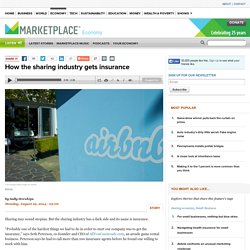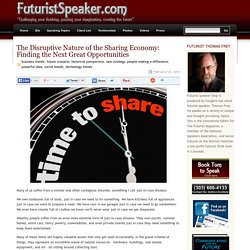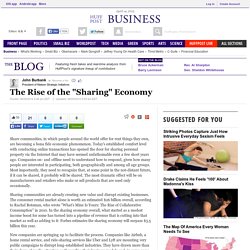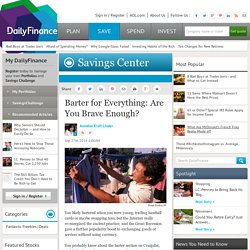

Myth of the sharing economy: There's no such thing. Never Mind the Sharing Economy: Here’s Platform Capitalism. 1.

A Backlash Against Sharing? Lately, the so-called “sharing economy” has been all over the news. Under flashy headlines such as “Sharing is the New Owning” it is heralded as the solution to the current financial crisis, the path toward a more sustainable economy or even the harbinger of a post-capitalist society. And while the “sharing economy” is supposed to be all these wonderful things at once, it also generates such disruptive and fantastically profitable businesses like AirBnB, Uber or TaskRabbit. No wonder then, that policy makers are getting increasingly excited about this ‘force for good’. Yet, while policy makers and their advisers can hardly contain their enthusiasm, over the course of the last few months there has been a veritable surge of critical comments on the “sharing economy.” After years of almost unequivocal enthusiasm for the innovative wonders of the “sharing economy,” a real debate finally seems to be emerging. 2. 3. 4. 5.
I agree. Sharing economy review: terms of reference. How the sharing industry gets insurance. Sharing may sound utopian.

But the sharing industry has a dark side and its name is insurance. “Probably one of the hardest things we had to do in order to start our company was to get the insurance,” says Seth Peterson, co-founder and CEO of AllYouCanArcade.com, an arcade game rental business. Peterson says he had to call more than 100 insurance agents before he found one willing to work with him. “Eventually what I did was I started to get my insurance license," he says, "because I thought if no one is going to underwrite this, I’ll underwrite this myself.”
Peterson says the brokers he talked to were okay with the arcade game part of his business: “Then we would say, 'Well, actually, though, we have these independent contractors who work for us, who fill demand across the entire United States.' The Disruptive Nature of the Sharing Economy: Finding the Next Great Opportunities. Many of us suffer from a sinister and often contagious disorder, something I call just-in-case disease.

We own toolboxes full of tools, just in case we need to fix something. We have kitchens full of appliances just in case we want to prepare a meal. The Rise of the "Sharing" Economy Share communities, in which people around the world offer for rent things they own, are becoming a bona fide economic phenomenon.

Today's established comfort level with conducting online transactions has opened the door for sharing personal property via the Internet that may have seemed unfathomable even a few short years ago. Companies on- and offline need to understand how to respond, given how many people are interested in participating, both geographically and among all age groups. Most importantly, they need to recognize that, at some point in the not-distant future, if it can be shared, it probably will be shared. The most dramatic effect will be on manufacturers and retailers who make or sell products that are used only occasionally. Sharing communities are already creating new value and disrupt existing businesses. How Cryptocurrency Could Change the Sharing Economy.
Grassroots efforts have defined much of recent technological history.

Whether we’re talking about file sharing via BitTorrent, disrupting money via bitcoin, or even the emergence of the web itself, innovation has often trickled up, rather than down. Even some of the companies that dominate today’s Internet started small, and gained traction quickly. Could the next generation of sharing economy companies do the same, backed by cryptocurrency-like tokens? The sharing economy The sharing economy is a potentially huge development. The sharing economy typically uses technology to help bring these people together. Uber has just been valued at $40bn, following its latest fundraising round. The sectors that can benefit from this business model are many and varied; transportation is a key one (taxi rides are down 65% in San Francisco thanks to ride-sharing firms) and accommodation is another.
A role for bitcoin micropayments. Barter for Everything: Are You Brave Enough? You likely bartered when you were young, trading baseball cards or maybe swapping toys, but the Internet really re-energized the ancient practice, and the Great Recession gave a further popularity boost to exchanging goods or services without using currency.

You probably know about the barter section on Craigslist, and U-Exchange boasts 70,000 members. Local Exchange Trading Systems includes tiny volunteer nonprofits and highly organized barter societies and clubs like NeighborGoods. More sophisticated swapping sites with mobile apps include swapdom.com (with its cute explanatory Lego video) or listia.com. However, as rapidly as barter sites start up, they can go out of business just as fast (like zwaggle or bookins) or change their business model (thredup.com is now sort of an online thrift shop). Almost anything you can imagine is being bartered for by someone -- be it vacation home stays, video games or garden plots. What are some examples of barter transactions? Barter transactions occur when economic actors, such as individuals, businesses and nations, exchange goods or services without the use of a monetary medium.

While a barter economy is considered more primitive than modern economies, barter transactions still occur in the marketplace. Below are simple examples of bartering for goods and services, along with a common contemporary barter exchange. Example 1: Bartering with Consumer Goods In its most elementary form, bartering is the exchange of one valuable product for another between two individuals.
Person A has two chickens but wants to get some apples; meanwhile, Person B has six apples but wants some chickens. Insurance For Peer-To-Peer Travel Rentals. Insurance for the 'sharing economy' Hotel chains and rental car companies may not be headed for the history books, at least not yet.

But lately, some savvy travelers have been moving away from these traditional travel providers and turning toward web-based newcomers that are part of what's been dubbed the "sharing economy. " Blog.